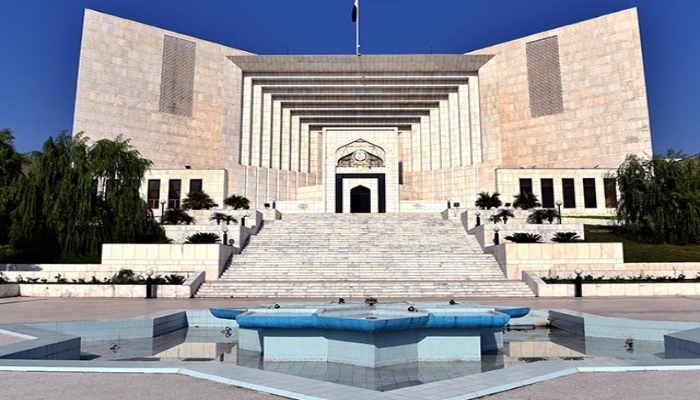During the hearing of the presidential reference on Tuesday, Supreme Court judge Justice Ijaz ul Ahsan said they first need to decide if the deviation from the party is right or wrong, adding that history testifies that practice is not just due to ‘awakening of conscience.’
He said they will look into other things when the deviation will be proclaimed wrong.
A five-member larger bench of the Supreme Court headed by Chief Justice of Pakistan (CJP) Justice Umar Ata Bandial and comprising Justice Muneeb Akhtar, Justice Ijaz ul Ahsan, Justice Mazhar Alam, and Justice Jamal Khan Mandokhel resumed hearing of the presidential reference seeking interpretation of Article 63(A) of the Constitution of Pakistan.
Justice Ijaz ul Ahsan said that even in the West, efforts were made to stop the practice. “What will be the punishment of the dissident member is the real question” he stated.
The opposition’s lawyer Farooq H Naek said the dissident member will be considered ineligible for the remaining duration of the assembly.
At this, Justice Jamal Khan Mandokhail said, “You are viewing veering from the party as a crime.” He said if the practice is a crime then ‘why the vote of criminal is counted?’
Farooq Naek said a person cannot be charged under section 302 merely on intending to commit a murder. “The real question is the duration of the punishment,” he added.
The counsel said Article 63(A) was incorporated into the constitution after the abolishment of Article 58(2)B.
CJP remarked that the Supreme Court was approached to give its opinion on the Senate election via open ballot. He regretted the top court’s opinion has not been followed to date.
He asked, “Why the political parties are neutral about deviation from the party?” He said a dissenter is awarded an office in the other party.
Justice Ijaz ul Ahsan said the constitution discourages a dissenter and its architects never encouraged the practice, he added.
Read more: CJP Bandial says Supreme Court expects politicians to defend its orders
Farooq Naek said deviation from the party is not deemed wrong in many countries, adding every country has its democratic norms and history.
Justice Jamal Mandokhel questioned, “Is dissenting from a party a crime? Shouldn’t a lawmaker be allowed to vote with his consent under specific boundaries?”
Justice Mazhar Alam Miankhel remarked that the political parties amend the constitution in their interest.
CJP asked if any political party could take advantage of defined punishment for a dissident member.
Farooq Naek said Article 96 in the constitution of 1973 barred the members from deviating from the party line and the member’s vote was also not counted.
He said a dictator amended Articles 62 and 63 in the constitution.
CJP said the court’s declaration was incorporated in Article 62(1)F of the 18th amendment.
Justice Jamal Khan asked if voting against the party is a crime. “What kind of crime is this which has been allowed by the constitution?”
Justice Ijaz ul Ahsan remarked that it has become a culture where only the favourable verdicts are accepted otherwise the justice is considered to be marred.



















